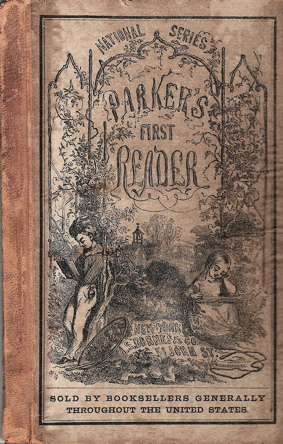 | |
 | ||||
On Spelling, | ||||
From the Preface to Parker's First Reader | ||||
This book is designed to follow the spelling book; but it must be borne in mind by the teacher, that all reading books should be used also as spelling books. In the preparation of this Series of Reading Books, I have been guided by experience of more than five-and-thirty years spent in the business of (mostly public) instruction. Three-and-twenty of those years have seen me at the head of one of the large public schools of this city, during which time I have had the opportunity of watching the effects of various modes of teaching pursued both in the primary and the grammar schools; and if I have failed to gain wisdom by this long experience, it was not from neglect of the opportunities I have enjoyed. It is not my intention in this place to discuss the merits of any particular plan that I have seen in operation, nor to arrogate superiority over others. I present these volumes as the result of my endeavors to furnish a series of reading books adapted to the standing of the pupil. I have one remark, however, to make, which, though it may seem at variance with the plans proposed and carried out by some with apparent success, I have little doubt will be found true, and that is, that it is scarcely possible to devote too much time to the spelling book. Teachers who are impatient of the slow progress of their pupils are too apt to lay it aside too soon. I have frequently seen the melancholy effects of this impatience. Among the many pupils that I have had under my charge, I have noticed that they who have made the most rapid progress in reading were invariably those who had been most faithfully drilled in the spelling book. A good hawk is better than a whole bag-full of game; and the fable of the hare and the tortoise applies as forcibly and as closely to the child's first endeavors as to any subsequent efforts. In the earlier stages of education, no better advice can be given than that which is conveyed in the quaint adage, Make haste slowly. Fruits and flowers produced by forcing in hot-beds rarely possess the raciness or the value of those which are properly and naturally matured. It is in vain to endeavor to sweeten or to gild the pill. The roots of learning are undoubtedly bitter, and the rudiments of letters possess few attractions to the child. Let him then advance boldly to the task. Let him learn, in the onset, that he has labor to undergo. There is no royal road to learning. Plunge him at once into the thickest of the fight. Teach him at once how to overcome difficulties, and his subsequent contests will be less discouraging, and his success will be complete. In the use of each of these volumes, it is recommended to the teacher to assign no larger portion of each Lesson as a Reading Lesson than can also be learned as a Spelling Lesson; and that the pupil should be made distinctly to understand that whatever portion he is required to read he will also be required to spell. The immature state of the minds of those for whom the First and Second Readers have been prepared renders it difficult, nay, perhaps useless, to endeavor to bring to the level of their comprehension the meaning of all the words which they are required to read. In the Third and Fourth Readers, much assistance is rendered in the form of Notes, while, at the same time, something has been purposely left for the pupil himself to do. With these few remarks, I submit this series of Reading Books ot the consideration of those who are interested in the business of education, trusting that a trial of the volumes may be made, and that their merits may be estimated solely by the result of such trial. R. G. P. [Note: excerpts from Parker's First Reader show the high reading level that can be achieved when the syllabary and Webster's Speller are used to teach reading.] | |